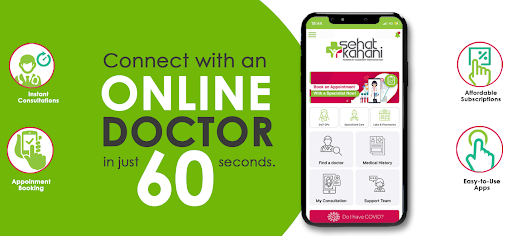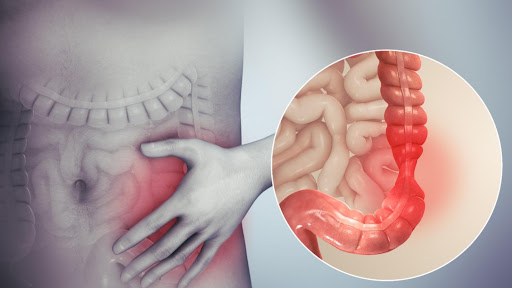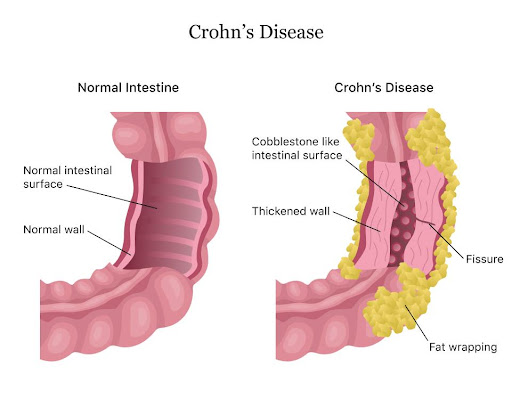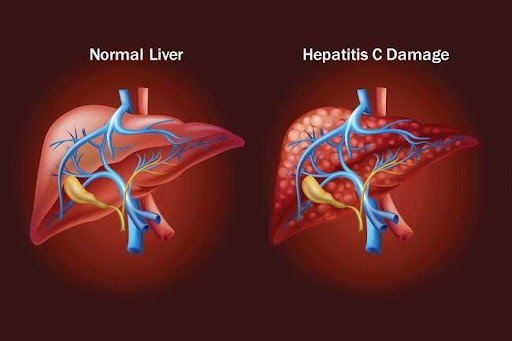
Introduction
With modern innovation and automation, people prefer the accessibility of the world to be on one tip of their fingers. Just like most of the services are becoming online, the healthcare system is also transforming by using modern technologies of telecommunication. Necessity is the mother of invention, and to enable access to healthcare for everyone, even in remote areas, the concept of telemedicine was introduced.
This blog contains a detailed account of what telemedicine is and what are the eight types of digestive diseases that can be treated in a telemedicine visit.
What is telemedicine?
Telemedicine utilizes the modernization of telecommunication to enable medical experts to assess, diagnose, and heal patients from a distance. Telemedicine applications include wireless tools, email, two-way video, smartphones, and other forms of telecommunications technology. Telemedicine can also be utilized for a variety of services. In the past ten years, the method has undergone a startling metamorphosis and is now playing a significant role in the healthcare system.
Benefits of telemedicine
Following are the major benefits of telemedicine;
- Comfort and convenience
- Elimination of transportation cost
- Safeguard from infectious diseases
- Convenient for long termed disease management

8 digestive conditions that can be treated in a telemedicine visit
Various digestive disorders require long-term management. Such diseases include hepatitis C, chronic pancreatitis, Crohn’s disease, etc. Advancements in telemedicine enable patients present all around the world to connect with their doctor’s expertise. Telemedicine urgent care can be utilized for the management of acute digestive disorders, for example, diarrhea and constipation.
Also Read: Symptoms of Diarrhea: Causes, Treatment, and Preventions
Diarrhea
Diarrhea is the condition of loose, watery, and frequent bowel movements. Especially in adults, it is typically not seen as a life-threatening disorder. When it affects youngsters, it should be handled seriously since, if left untreated, it can be fatal. It is crucial to remember that diarrhea that lasts longer than two weeks may be a sign of another underlying condition. Irritable bowel syndrome (IBS), inflammatory bowel disease (IBD), and celiac disease are a few examples of these illnesses.
Diarrhea is one digestive disorder that can be treated easily using telemedicine. In your online consultation, your doctor will check your physical symptoms, take your medical history, and will enquire about your current medications and diet. In most cases, the doctor will explain how to manage diarrhea at home using prescribed medicine and an appropriate diet. In case your condition is serious, your doctor might refer you to a local clinic.

Irritable bowel syndrome
Irritable bowel syndrome, commonly known as IBS, refers to a long-term disorder of the digestive system. The major symptoms of IBS include abdominal cramps, watery bowels, and constipation. Irritable bowel syndrome is a chronic disorder and thus requires prolonged medical assistance.
The occurrence of severe symptoms is rare and requires medication and counseling. Most people with IBS tend to manage their symptoms by making effective alterations in their diet. Lifestyle changes and stress management can also help people with IBS.
IBS symptoms might vary, but most of them reoccur. The most typical ones are:
- Abdominal pain in defecation
- Cramps or bloating
- Changes in the appearance of stool
- Changes in stool regularity
- The feeling of incomplete defecation
- Increased gas in digestive system
- Stool with mucus
Being a long-termed disease, IBS can be managed effectively by regular telemedicine visits. Along with proper medication, and dietary and lifestyle changes, you can also benefit from teletherapy. Teletherapy is the application of telemedicine to the practice of mental health therapy and counseling. Teletherapy, in general, refers to mental health care that is provided by technology like video conferencing. It helps in the management of symptoms of IBS and helps you lower the pain.

Constipation
Constipation is a digestive disorder that causes painful and inconsistent bowel movements. Pain in these movements is caused due to the firmness and dryness of the stool. In patients with constipation, the frequency of bowel movements decreases up to less than four times a week. If the condition of constipation lasts for more than a few weeks, it is called chronic constipation. Chronic constipation can be painful and can hinder your everyday activities. By putting extra strain to pass a stool, constipation can lead to another serious condition called piles or hemorrhoids.
Whether you have acute or chronic constipation, you can improve your condition by utilizing telemedicine. Constipation is usually a result of poor bowel habits and lifestyle choices. During your telemedicine visit, your digestive doctor will enquire about your health history, a summary of life style, and general bowel habits. According to the information provided, the doctor will treat your condition either with my medicines or by recommending appropriate modifications in your diet and lifestyle.
Cirrhosis
Cirrhosis is a digestive disorder in which scarring develops on the liver as a result of prolonged damage to the tissues of the liver. The liver has self-healing properties and can resist damage to a certain point. However, prolonged damage leads to the development of scars which makes the tissues lose their functionality. This scarring is called fibrosis. Cirrhosis if not timely treated can lead to liver failure.
Fatigue and extremely itchy skin are only two of the many indications and symptoms of cirrhosis. They might not show up until the liver has suffered severe damage. The most common causative agents of cirrhosis include chronic hepatitis C, chronic hepatitis B, nonalcoholic fatty liver disease, and alcoholic liver disease.
According to a 2019 study in the World Journal of Gastroenterology, telehealth visits can significantly lower the number of hospital admissions for cirrhotic patients. With the use of video chats and wireless blood pressure monitors, doctors may assist patients in remotely monitoring their symptoms. With timely treatment, you can prevent hospitalization and further damage to your liver.
Crohn’s disease
Crohn’s disease is a digestive order which causes inflammation in many parts of the gastrointestinal tract, most frequently the small intestine. Crohn’s disease can be categorized as a type of Inflammatory bowel disease (IBD). Inflammation caused by Crohn’s disease can cause exhaustion, abdominal cramps, weight loss, malnutrition, and severe diarrhea. Apart from the symptoms being both unpleasant and incapacitating, if not treated then can turn to be fatal.
Unfortunately, there is no cure for Crohn’s disease. Medications are used to manage the symptoms and promote inflammatory healing. With medication, many Crohn’s disease sufferers can lead productive lives.
Management of Crohn’s disease necessitates the consumption of high doses of prescription medicine. These medicines can cause side effects in your body. In this case, telemedicine is a convenient option to keep an eye on the effects of the medication. It can also be used for the adjustment of dosage according to the symptoms.

Chronic Pancreatitis
Pancreatitis is the inflammation of pancreatic tissue. Exocrine and endocrine pancreatic parenchyma are irreversibly destroyed by chronic pancreatitis. It is a persistent inflammatory condition that is caused due to atrophy and/or replacement with fibrotic tissue. Functional repercussions include diabetes mellitus, malabsorption, and excruciating stomach pain.
Abdominal discomfort is the primary sign of chronic pancreatitis. The pain may come on suddenly and severely or it may come on in more gradual stages. Some patients have persistent agony. Other indications of chronic pancreatitis include glucose intolerance, backache, acid reflux, weight loss, vomiting, and fatty stools.
Being a chronic disease, this digestive disorder also requires long-termed medical attention, alterations in dosages, and persistent care and for that telemedicine can help. The specialists can also help in managing the pain and other symptoms.
Indigestion
Indigestion is a common digestive disorder. It is medically known as dyspepsia and is commonly called upset stomach. The common symptoms of indigestion include stomach pain and a feeling of fullness shortly after eating. Indigestion is itself a digestive disorder but it may also be indicating some other underlying digestive problems.
Acid reflux is a condition that tends to cause indigestion. During an acid flux, digestive acids from stomach reflux to the throat and cause damage and irritation to the stomach and throat. The symptoms of indigestion aggravate by alcohol consumption, anxiety, stress, pregnancy, obesity, and by consuming a diet rich in tomatoes, chocolate, fatty foods, coffee, etc.
A telemedicine visit for indigestion will not only help you in the management of the symptoms but by taking a proper medical history and going through your signs, your doctor might also be able to pinpoint the underlying cause of indigestion.
Hepatitis C
Hepatitis C is also a major digestive disorder. It is the inflammation of the liver caused by the infection of the Hepatitis C virus (HCV). The conventional routine for the treatment of hepatitis C for years was through injections and oral medications. These treatments were difficult for patients with other health conditions as they had some major side effects. However, the therapy has changed now. Using technological advancements in healthcare, oral medicines used daily for two to six months can usually cure chronic HCV.
People who reside in rural locations can obtain hepatitis C treatment because of telemedicine visits. Through telemedicine, patients and medical professionals can discuss any medication-related adverse effects and the overall efficacy of the treatment.
Conclusion
The bottom line is that you can rely on telemedicine for digestive issues. Whether you schedule an urgent telemedicine visit for your diarrhea or rely on it for the long-termed management of chronic digestive diseases; in today’s world, it is the better, smarter, and cost and time-effective choice.





